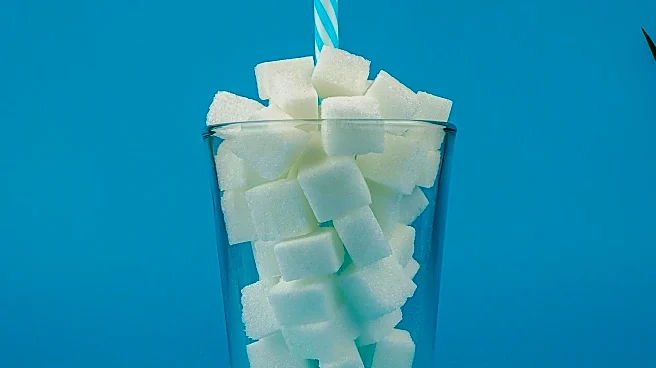What is the story about?
What's Happening?
A new study has found that both sugary and sweetened drinks are associated with a higher likelihood of developing metabolic dysfunction-associated steatotic liver disease (MASLD), commonly known as non-alcoholic fatty liver disease. The research, conducted with 123,788 participants from the UK Biobank, revealed that sweetened drinks pose a greater risk, with a 60% increased chance of liver disease from daily consumption exceeding 250g. Sugary drinks also increase the risk, albeit slightly less, at 50%. The study highlights the need for consumers to reduce intake of these beverages and suggests replacing them with water to lower liver disease risk.
Why It's Important?
The findings challenge the perception that 'diet' drinks are a healthier alternative to sugary beverages. Both types of drinks contribute to liver disease through different mechanisms, impacting metabolism and gut health. This study underscores the importance of dietary choices in preventing liver-related health issues, which are becoming increasingly prevalent. The results may influence public health policies and consumer behavior, encouraging a shift towards healthier beverage options and potentially leading to regulatory changes in labeling and marketing practices.
What's Next?
The study's findings may prompt health organizations to issue guidelines recommending reduced consumption of sugary and sweetened drinks. Public health campaigns could focus on educating consumers about the risks associated with these beverages and promoting water as a healthier alternative. The beverage industry might face increased scrutiny and pressure to reformulate products to reduce health risks. Further research could explore the long-term effects of these drinks on liver health and other metabolic disorders.
Beyond the Headlines
The study highlights broader implications for the beverage industry, which may need to address consumer concerns about health risks associated with their products. Ethical considerations arise regarding the marketing of 'diet' drinks as healthier options. The findings could lead to cultural shifts in consumer preferences, with increased demand for healthier, natural beverage alternatives. This may drive innovation in the industry, focusing on developing products that align with health-conscious consumer trends.
















